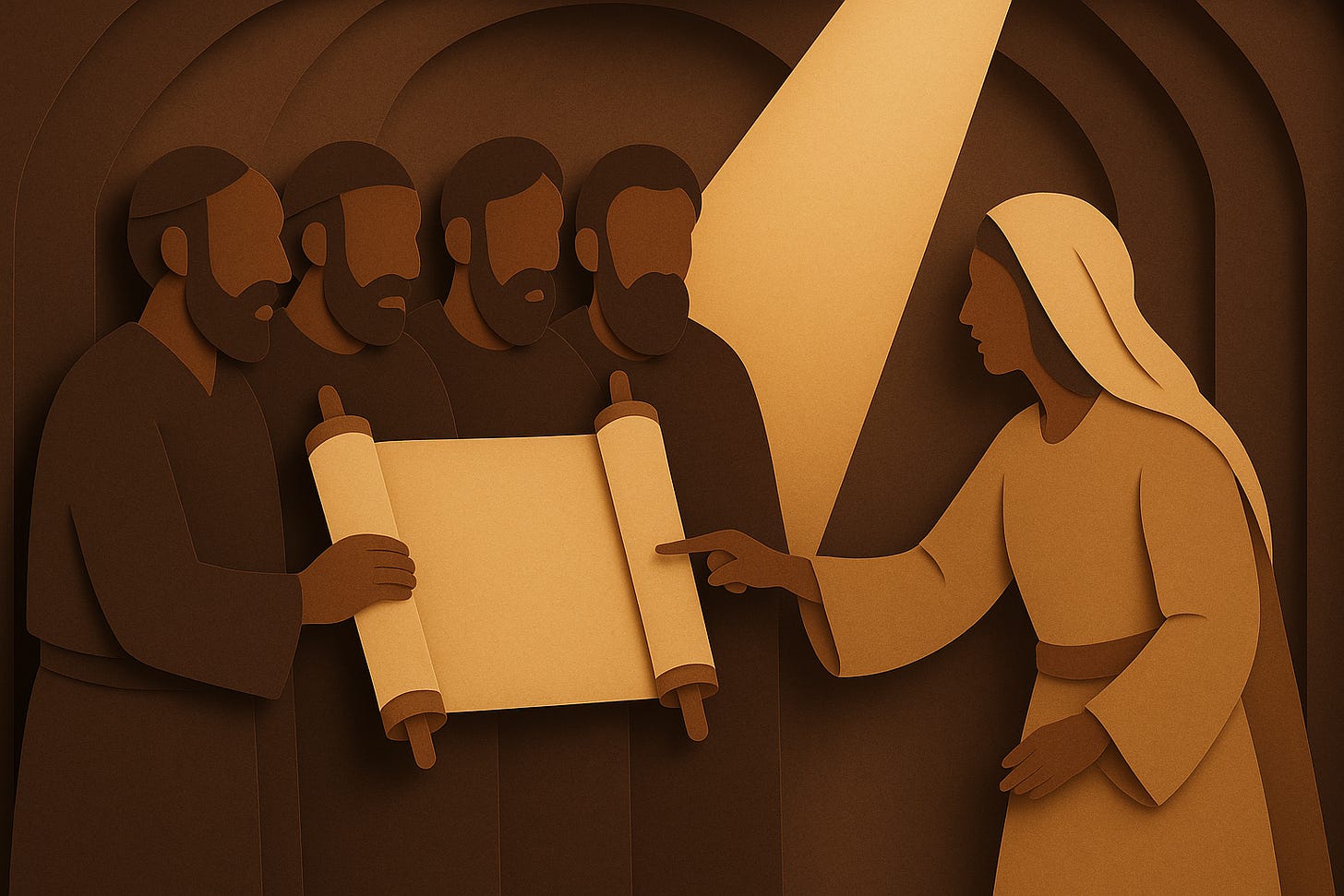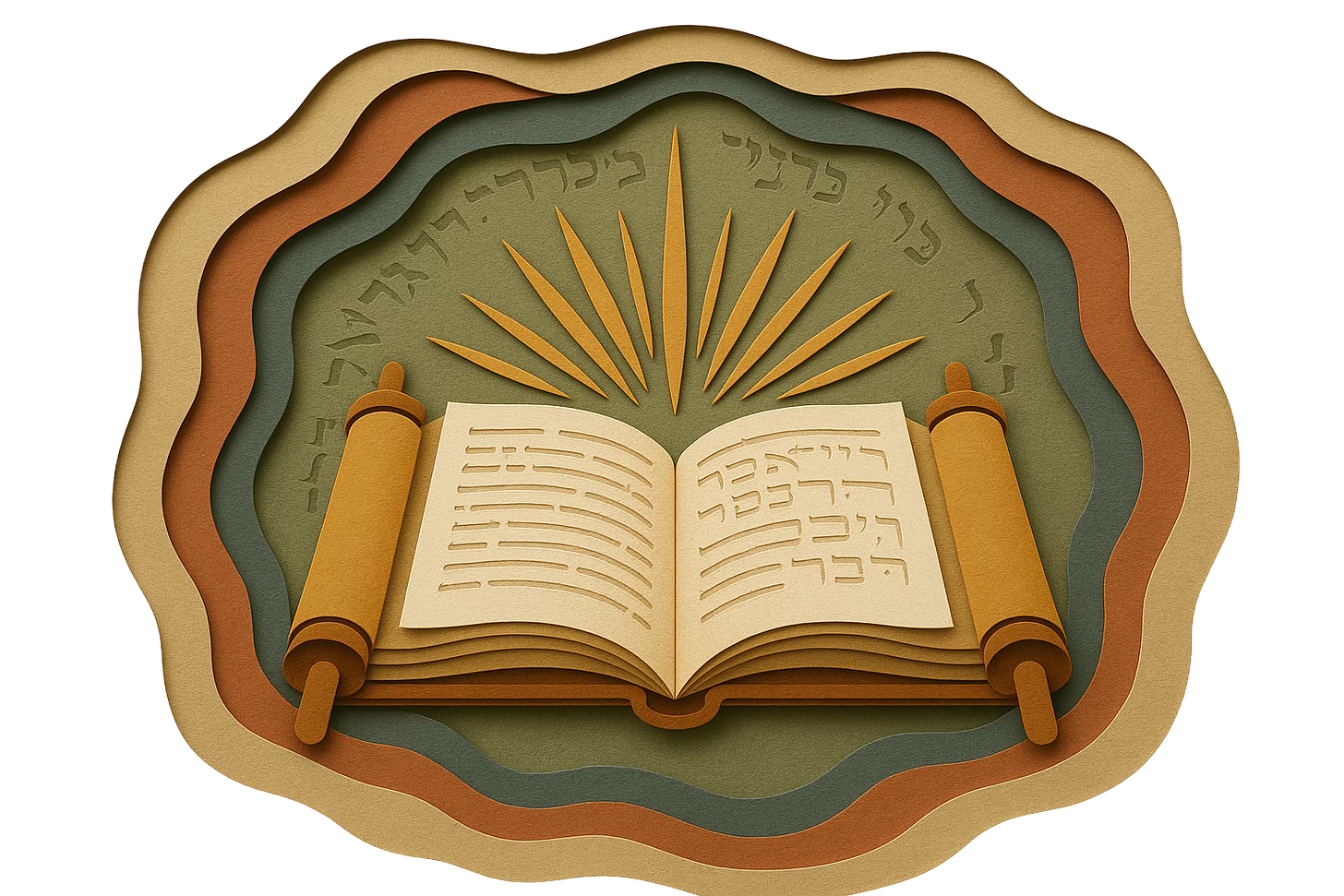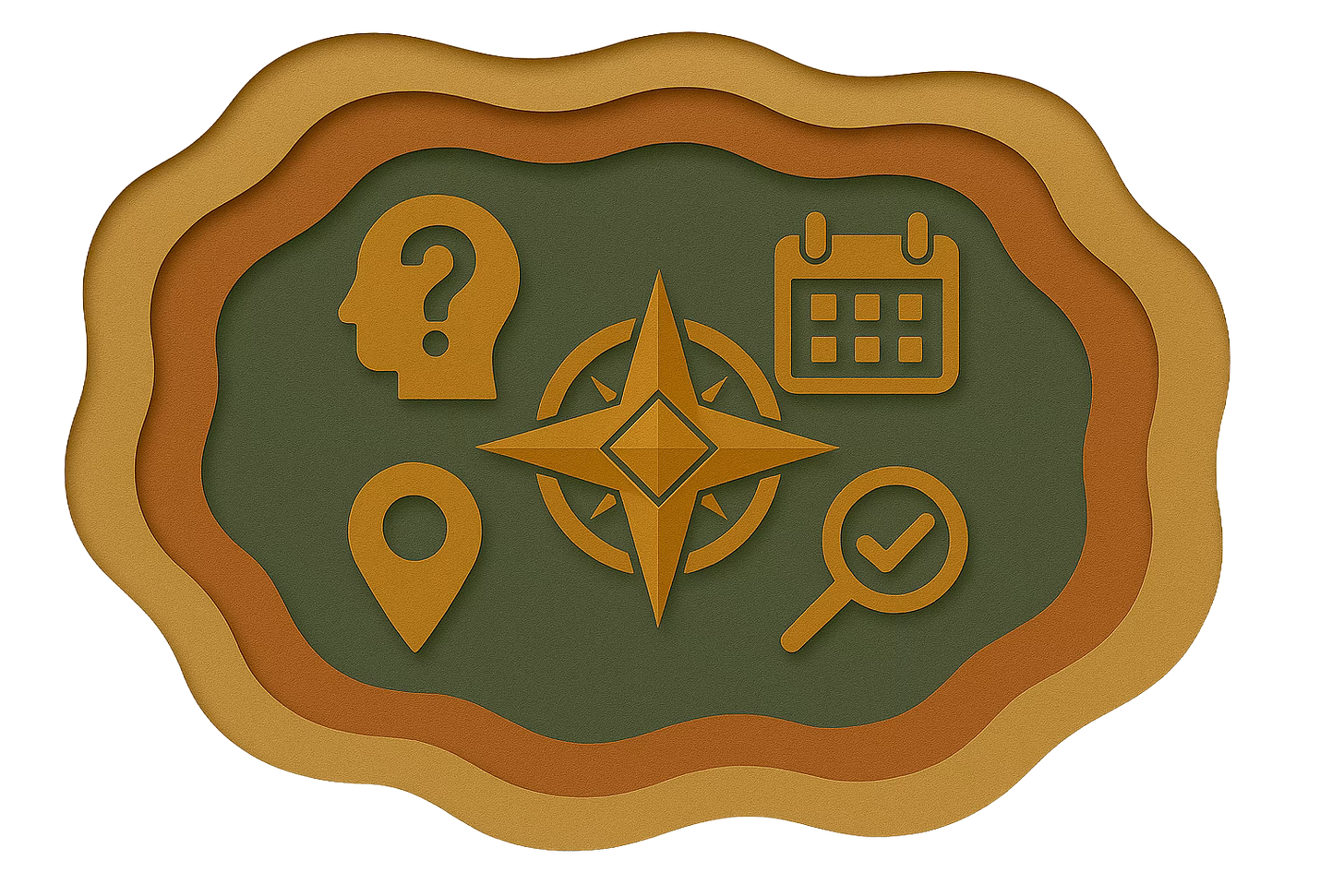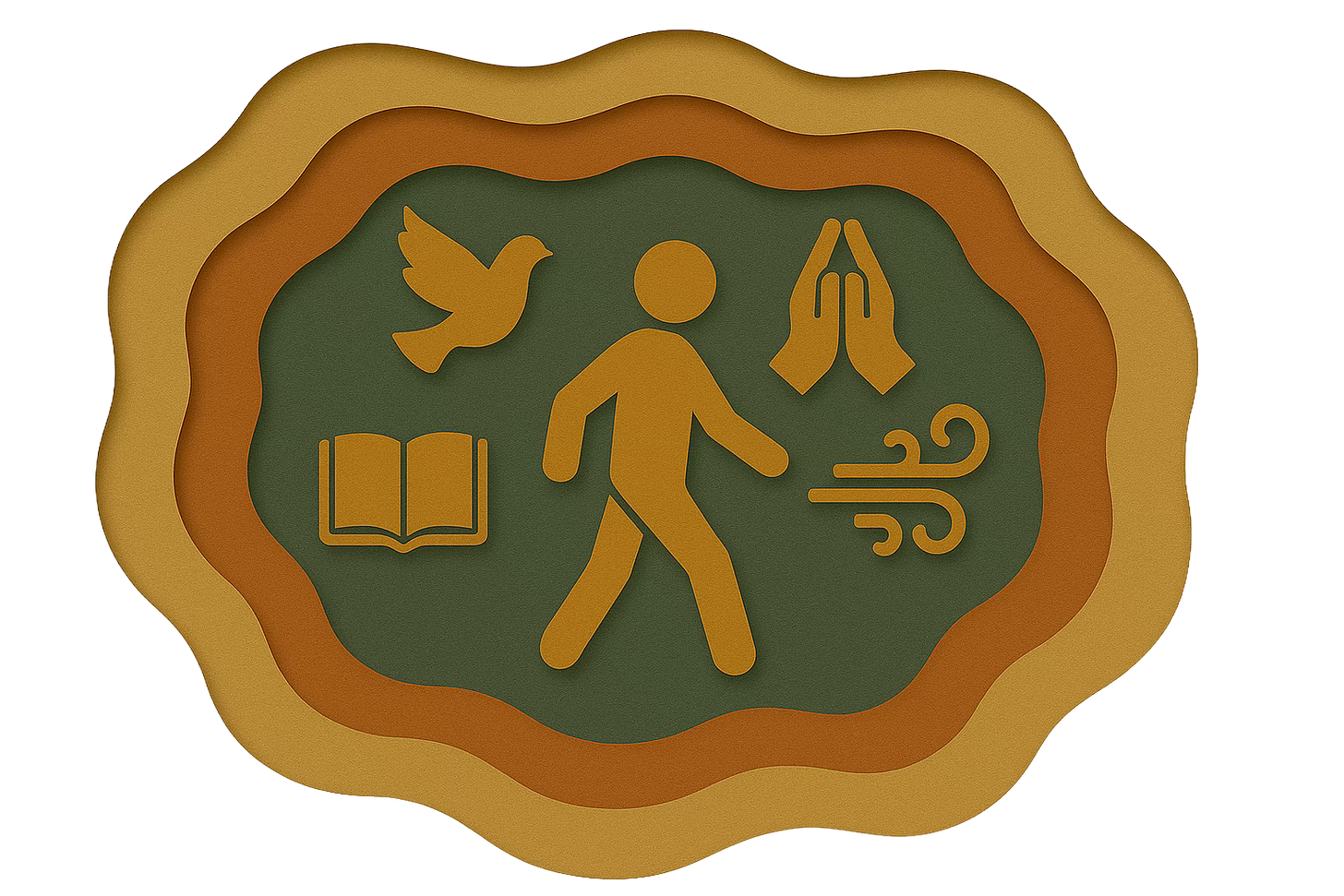When the Word is Lost: Huldah, Josiah, and the Unlikely Guardian of Truth
How a buried Torah, a bold woman, and a humble king sparked a revival
When the Word is Lost: Huldah, Josiah, and the Unlikely Guardian of Truth
Weekly Series | 2 Kings 22:19
How a buried Torah, a bold woman, and a humble king sparked a revival
Imagine a people so disconnected from their spiritual roots that the very words of Yah are buried and forgotten in their own house of worship. Into this spiritual vacuum steps Huldah — an unexpected prophetess whose courage confirmed the truth and shook a king to the core.
Josiah, confronted by the rediscovered scroll, tore his royal robes in grief, humbled himself, and called the nation back to covenant faithfulness. Centuries later, Yeshua would fulfill the heart of that covenant once for all, so that no one would ever be separated from Yah’s voice again.
Scripture: The Living Word
Key Passages
2 Kings 22:8–20 — The Book of the Law rediscovered in the Temple; Huldah’s bold prophecy confirms its authority.
2 Chronicles 34:14–28 — Parallel account showing the covenant curses and Josiah’s repentance.
2 Kings 23:21–23 — Josiah restores the Passover with unmatched faithfulness.
Luke 22:20 — Yeshua inaugurates the new covenant in His blood.
Galatians 3:13 — Messiah redeems us from the curse of the law.
Key Verse
“Because your heart was responsive and you humbled yourself before the Lord … I also have heard you, declares the Lord.”
(2 Kings 22:19)
Context: Behind the Words
The Temple stood in ruins of spirit, if not stone. Though the priests still offered sacrifices and kept a form of worship alive, the living voice of Yah had grown faint — buried under layers of idolatry, false altars, and cultural compromise. Generations bowed to Baal, erected Asherah poles, and even sacrificed their own children in the very place where Yah had once put His name.
Then a spark: a young king named Josiah, whose heart still longed for the God of David. During repairs of the neglected Temple, a hidden scroll emerged — a scroll containing Yah’s covenant words, lost for decades in the house of worship. When the scroll was read, its words thundered through Josiah’s heart, tearing down every illusion of false security.
Yet the nation needed confirmation. Was this truly Yah’s word after so many years? Josiah’s officials turned, not to the famous prophet Jeremiah, but to a prophetess living in Jerusalem’s Second Quarter — a woman named Huldah. She became the unlikely guardian of truth, boldly verifying the scroll’s authority and launching one of the greatest covenant renewals in Judah’s history.
Historical Background
Judah had suffered decades of spiritual decay under kings like Manasseh and Amon.
The Temple itself was polluted with pagan idols, altars, and ritual prostitution.
People relied on religious traditions and cultural memory rather than the actual covenant Yah gave Moses.
Who Was Huldah?
A respected prophetess who spoke faithfully for Yah.
Married to Shallum, the royal wardrobe keeper, with ties to the palace.
Lived in Jerusalem’s Second Quarter (2 Kings 22:14), making her accessible and trusted by the officials.
God elevated her voice — an unexpected woman in a male-dominated culture — to confirm His truth.
The Rediscovered Scroll
Called “the Book of the Law” (2 Kings 22:8).
Likely contained all or part of Deuteronomy, because Josiah’s reforms so closely matched its covenant warnings and centralized worship instructions (Deuteronomy 12, Deuteronomy 28).
Most biblical scholars agree Deuteronomy best fits the context.
Its reading cut Josiah to the heart, exposing how far Judah had wandered from Yah’s covenant.
Why Consult Huldah Instead of Jeremiah?
Huldah lived in Jerusalem, close to the Temple and palace, and was readily accessible (2 Kings 22:14).
She was already respected and trusted in the royal court.
Jeremiah, though active during Josiah’s reign (Jeremiah 1:2–3), may have been elsewhere or less directly connected to the Temple network.
Yah showed He can speak through any faithful servant, including an unexpected voice like Huldah.
From Tradition to Truth
When Yah’s Word is neglected, even worship becomes hollow tradition.
Rediscovering Scripture can be painful — but it is the only way to see how far we have strayed.
Huldah reminds us that Yah’s truth stands, no matter how long it has been buried.
Covenant: The Relational Core
When Josiah heard the words of the rediscovered scroll, he tore his royal garments in grief — realizing Yah’s covenant had not just been neglected, but betrayed. The scroll, most likely centered on Deuteronomy, spelled out Yah’s relationship terms: blessings for loyalty, curses for rebellion. Judah had violated nearly every command.
Yet Yah had not forgotten His covenant, nor had He forgotten His people. Through Huldah, He made clear that His word still stood, even after generations of neglect. Josiah’s humble response showed what covenant faithfulness truly looks like: a heart willing to repent, reform, and return to Yah with everything.
That moment of rediscovery pointed forward to Yeshua, who would come not to rewrite the covenant, but to fulfill it perfectly — taking the curse on Himself so that those who turn back to Yah would never again be separated from His voice.
Covenant as Relationship
The Torah was never merely rules; it was Yah’s covenant, His relational agreement with His people.
Israel was called to reflect Yah’s character to the nations.
Abandoning the covenant meant abandoning their true identity.
Josiah’s Response
Tore his clothes, humbled himself, and wept before Yah (2 Kings 22:19).
Launched sweeping reforms, tearing down pagan shrines, removing idols, and restoring true worship.
Commanded a Passover unlike any since the days of Samuel (2 Kings 23:21–23).
Yah promised Josiah he would be spared from seeing Judah’s destruction, granting him peace in his lifetime because of his humble and righteous heart (2 Kings 22:20).
Shows us that covenant faithfulness means action, not just emotion — and that Yah honors a repentant heart.
Huldah: The Unlikely Covenant Witness
Confirmed the scroll’s authority without hesitation.
Prophesied truth to a king — declaring judgment, but also highlighting mercy for Josiah.
Modeled courage and clarity in a moment of national crisis.
Yeshua and the New Covenant
Inaugurated a new covenant through His blood (Luke 22:20).
Redeemed us from the curse of disobedience (Galatians 3:13).
Wrote the Torah on our hearts by His Spirit (Jeremiah 31:31–33).
Became the perfect covenant keeper, restoring the relationship Yah always intended.
Judgment and Mercy
Josiah’s generation still faced national consequences — exile was coming.
Yet Josiah himself found peace because of his humility and obedience.
In Messiah, we see the same pattern: God’s judgment is real, but those who repent and trust Yeshua will be saved.
Practice: Living It Out
Josiah’s story reminds us that rediscovering Yah’s Word isn’t meant to remain a moment of inspiration — it demands transformation. He didn’t just weep over the covenant; he acted on it, tearing down idols, rebuilding worship, and calling people back to faithfulness. Huldah’s bold confirmation of the scroll reminds us that Yah will use surprising voices to push us back to His truth — if we are humble enough to listen.
Today, we are incredibly fortunate: Yah’s Word is not hidden in a dusty Temple corner. It is widely accessible, translated into countless languages, available on screens, apps, and books around the world. Yet for many, it is still as if the Word has been lost — hidden in plain sight, buried under cultural habits, traditions, or apathy.
Think of how easily believers scroll past fragments of Scripture on social media, feeling inspired for a moment but never letting it change their lives. Worse, these fragments are sometimes ripped out of context and even weaponized to justify division, hatred, or self-righteousness — far removed from the heart of Yah’s covenant. Or think of how a pastor might challenge people to reject a self-centered Christianity, only to have that truth drowned out by a consumer-driven culture of comfort.
Like Josiah, we must respond to Yah’s Word with action, not just emotion — tearing down every idol that competes with our loyalty and returning to wholehearted covenant faithfulness.
Key Takeaways
Reformation starts with rediscovering Yah’s Word. Like Josiah, we need to let Scripture break our hearts and shape our lives.
God can speak through unexpected voices. Huldah’s story proves Yah is not bound by our categories. Listen for truth, even if it comes from surprising places.
Personal repentance matters, even if judgment falls around you. Josiah shows that individual faithfulness can bring peace and favor, even in a broken world.
Discussion Questions
Where is Yah calling you to reform areas of your life according to His Word?
Who might be a “Huldah” in your circles — someone whose words confirm truth you might be ignoring?
What idols or compromises might you need to tear down to return to covenant faithfulness?
Seven-Day Practice Rhythm
Josiah’s rediscovery of the scroll didn’t stop at reading — it moved him to bold, practical obedience. This week, follow a rhythm of covenant faithfulness using these daily steps:
Closing Blessing
May the same Spirit who spoke through Huldah, who confirmed Yah’s covenant to a humbled king, and who inspired Josiah to reform his nation, stir your heart today.
May you rediscover Yah’s Word in its fullness, and refuse to let it grow dusty in the corners of your life. May you tear down every idol that competes with your loyalty, and stand firm even if the world around you crumbles.
May Yeshua — the living Torah, the one who fulfilled the covenant perfectly — write His Word on your heart, anchor you in His love, and keep you in peace.
Go forth in His strength, bold in truth, humble in repentance, and certain of His grace.






